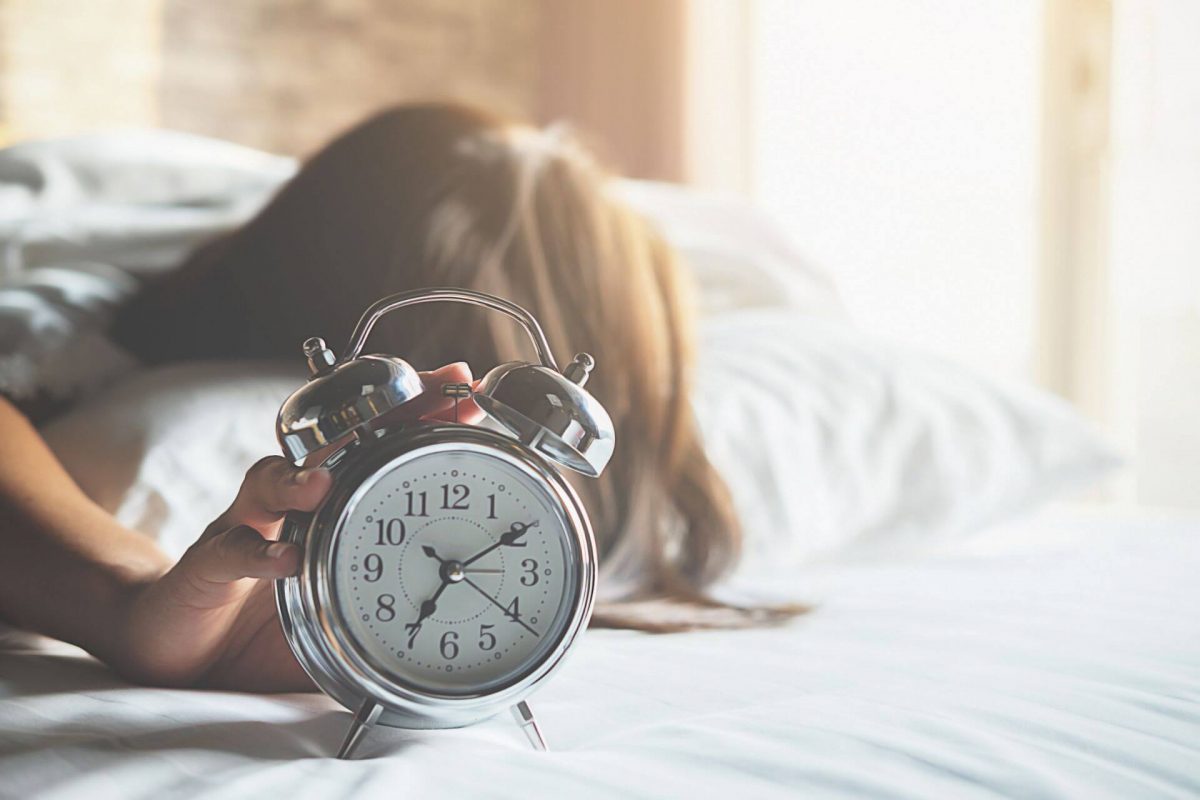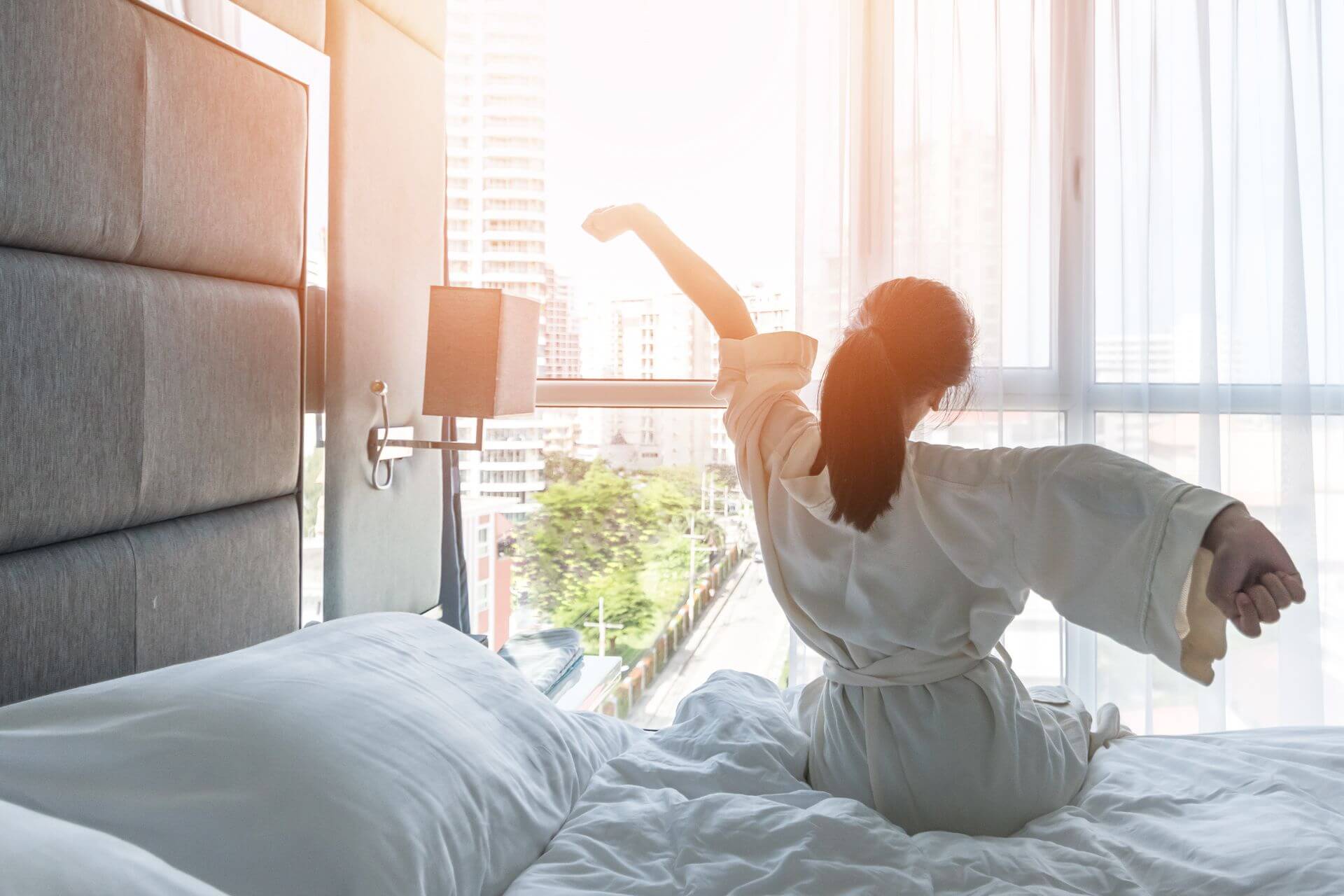You often hear that there’s “nothing like a good night’s sleep”. That’s because sleep plays an integral role in your everyday life and your overall mental and physical health.
While a good night’s sleep empowers the body to take on the day, many people, especially in the Western World, have sleep problems and struggle to get the rest that they need.
In the USA, almost half of all adults said that they felt sleepy during the day between three and seven days per week, with almost a third of workers reporting sleeping six or fewer hours per night.
A lack of good-quality sleep affects people of all ages and can have multiple causes and consequences.
How much is a healthy amount of sleep?

Sleep is vitally important. We can’t function without it. It restores the body, fuels the mind and strengthens virtually every system in the body. But how much sleep do we need to feel the benefits?
For most people, the automatic answer is “8 hours”. However, while this is correct, it’s not so straightforward.
The National Sleep Foundation advises getting between 7 and 9 hours of sleep per night for healthy adults. And it may be a cliché that teenagers spend all day in bed, but they, along with young children and babies, do need more sleep for growth and development. Those who are over 65 can function with less sleep, but should still also get between 7 and 8 hours per night.
It should be noted that these recommendations are generalised and don’t take into account several important factors. Deciding how much sleep would be optimal for you means considering your overall health and your level of activity.
If you think you’re not getting enough sleep, ask yourself the following questions:
- Do you need a nap during the day to be fully productive?
- Do you expend a lot of energy during the day (manual labour or exercise)?
- Do you operate heavy machinery or drive for a living and find that you’re not always fully focused?
- Do you need caffeine to get you through the day?
- On your days off, do you sleep more than you would on a workday?
If the answer is “yes” to more than one of these questions, it may be time to reconsider your sleep schedule. Poor or insufficient sleep can be an indication of an underlying medical condition and could lead to harmful consequences.
The effects of sleep deprivation on your body
Getting insufficient or poor-quality sleep can have many negative effects on the body, contributing to stress which, over a long period of time, can lead to burnout.
When stressed, your body releases ‘stress hormones’ such as cortisol, which can keep you awake, thus making your sleeping problems worse.
With regard to the central nervous system, a lack of sleep can lead to disastrous consequences. For example, drowsy driving leads to more than 6,000 fatal car crashes in the US every year. Likewise, nurses who work 12.5-hour shifts commit more than three times as many medical errors than those working 8.5-hour shifts.
Sleep is necessary to keep your body sending and processing information properly. Good-quality sleep enhances your focus, creativity and decision-making. Without it, you may take longer to finish tasks or react to things, you’ll find it more difficult to concentrate or learn new things and you’ll experience decreased coordination and face an increased risk of accidents. In fact, those with severe insomnia are seven times more likely to have work-related accidents than good sleepers.
Bad sleep is also bad for your immune system. Your body’s antibodies and cytokines are produced during your sleep and these combat foreign invaders such as bacteria and viruses. A lack of sleep may also mean it takes you longer to recover from illness and that your risk of chronic conditions, such as diabetes and heart disease, is increased.
Good sleep is vital for a healthy heart. Research shows that bad sleep is linked to high blood pressure, cardiovascular plaque buildup, increased cholesterol levels and a heightened risk of developing heart arrhythmias, heart failure and coronary artery disease.
Sleep can also impact your weight. When you’re low on energy, you may eat more than usual, leading to weight gain. You’ll also have less energy to do exercise. It’s also thought that a lack of sleep increases appetite because it changes the level of hormones that signal hunger in your body, potentially increasing cravings for junk, high-calorie or high-sugar foods.
Bad sleep and mental health

Not only is getting good sleep important to physical health, but it also has plenty of psychological benefits too.
Bad sleep not only negatively affects your mental abilities (including decision-making processes and creativity) but also your emotional state, making you more impatient, impulsive or prone to mood swings. A lack of sleep also affects the language you use, your reasoning and your communication skills. This, in turn, can lead to conflict and have a negative effect on your relationships.
Conversely, getting enough sleep can help you to regulate your emotions and maintain good interpersonal relationships.
In more extreme cases, sleep deprivation can bring on anxiety, depression, paranoia and suicidal thoughts. If you have mental health problems such as these, they can form part of a vicious circle: not getting enough sleep increases your risk while the conditions themselves can be obstacles to getting good sleep. Luckily, improving one can lead to improvements in the other.
How do I get better quality sleep?
In addition to mental health problems, there are myriad reasons why you might not be getting good sleep. The most obvious is poor planning.
If sleep is not part of your schedule, you need to make it a higher priority. This means factoring in the hours you need so that it doesn’t become a trade-off with work or social activities – no matter how tempting.
Improving your so-called ‘sleep hygiene’ will also help. This includes your bedroom setting and your sleep-related habits. You could, for example, try to stick to the same sleep schedule every day, even on weekends. You could also incorporate a new pre-bed routine that helps you to relax and fall asleep quickly.
However, there are also practical elements that you could improve. Getting a new mattress which is both comfortable and offers good support can make a massive difference. So can new pillows and bedding.
Stopping external light and sound from entering your room will also help. As well as making sure that the room is at a comfortable temperature during sleeping hours.
Abstaining from caffeine and alcohol in the hours before going to bed can also be beneficial, as well as staying away from electronic devices like mobile phones and laptops.
However, one major way in which you can improve your sleep is by interrupting your usual schedule completely. If, in addition to poor-quality sleep, you’re also struggling with stress, anxiety or burnout, taking a wellness break could be exactly what you need.
Wellness at White River Manor

If poor sleep is a major contributor to your stress or psychological issues, White River Manor is the perfect place for you to reset and take time to focus on your well-being.
Our breathtaking surroundings provide an ideal, restorative environment for your recovery journey. We guarantee your comfort and well-being throughout your stay with us.
Cut out your day-to-day distractions, get a change of scenery and rest and recharge in total luxury in the heart of South Africa.
At White River Manor, our wellness program can help you to reset and teach yourself new habits that will empower you to face the future with renewed energy and vigour.
If you want to find out how we can help you, please get in touch today!







